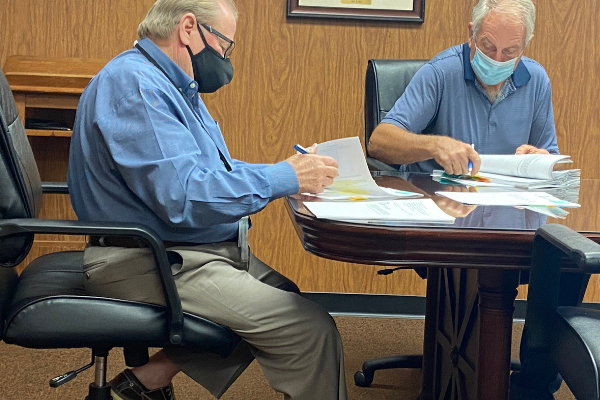LAWTON – Comanche County is changing the way it handles certificates of compliance for medical marijuana-related businesses.
The Board of Comanche County Commissioners voted 3-0 Monday to approve the change, which will not take effect until the county receives more certification requests to consider.
The state requires medical marijuana-related businesses to obtain a certificate of compliance as part of their application for either a new license or a renewal. The political subdivision where the business is located – usually a city or county – issues the certificates, which indicate that the business complies with all applicable state and local codes, including electrical, fire and building standards.
Certification is based on information that the business provides to the city or county, as well as information from that political subdivision.
The state fire marshal’s office reported recently that many medical marijuana growing operations are not complying with state building codes, Commissioner Alvin Cargill said Monday. He said the fire marshal’s office has suggested that county officials should not sign certificates of compliance for those businesses unless the state authorizes the county to do its own code enforcement.
Cargill said the fire marshal’s office recommended developing a letter for medical marijuana-related businesses seeking a certificate of compliance, which explains the county’s reason for not signing the certificate. The letter would also cite relevant state law and refer the business to the fire marshal’s office for compliance checks and enforcement of state codes.
If the business met state standards, the fire marshal’s office would notify the county of its findings. Armed with the notification, the county could then sign off on the certificate of compliance.
Approving a certificate before the fire marshal’s office weighs in could create liability problems for the county, Cargill said.
“What’s happening is they’re starting to see a lot of injuries – personal injuries – from these grow houses,” he said. “And then what they (the fire marshal’s office) said is by us signing that, it’s putting us at risk for any liability.”
The commission will work with its legal adviser on developing the letter.
Assistant State Fire Marshal James Fullingim said Tuesday the fire marshal’s office had participated in a panel discussion about the medical marijuana industry, which was part of Oklahoma county commissioners’ annual conference in August. The panel also included representatives from the Oklahoma Medical Marijuana Authority and the Oklahoma Bureau of Narcotics.
Fullingim said the fire marshal’s rules apply to all types of businesses – not just the medical marijuana-related companies. He said many people who apply for a building permit in the county where they want to set up shop don’t realize that they need to seek that permit from the state instead, since the county typically does not have jurisdiction.
The problem existed before medical marijuana became legal in Oklahoma, Fullingim said.
“It looks like a new problem just because of all the activity surrounding the marijuana,” he said. “We have a lot more building in unincorporated areas than we used to have, so the situation has been compounded significantly.”
Most growing operations that are housed indoors are billed as greenhouses, which do not require a building permit, Fullingim said. But if the owner installs an electrical system and a set of grow lights, the state fire code classifies those buildings as factories, not greenhouses.
“It doesn’t matter what you’re growing in there,” Fullingim said. “Once you turn it into a factory, it requires a building permit.”
Fullingim said the fire marshal’s office was not singling out medical marijuana businesses, because the real issue was about constructing buildings in unincorporated areas. He noted that businesses typically set up shop in a city, and most cities take steps to ensure that buildings within city limits meet state requirements.
“But once you get out of the city, it’s less common that a county assumes that role,” Fullingim said.


